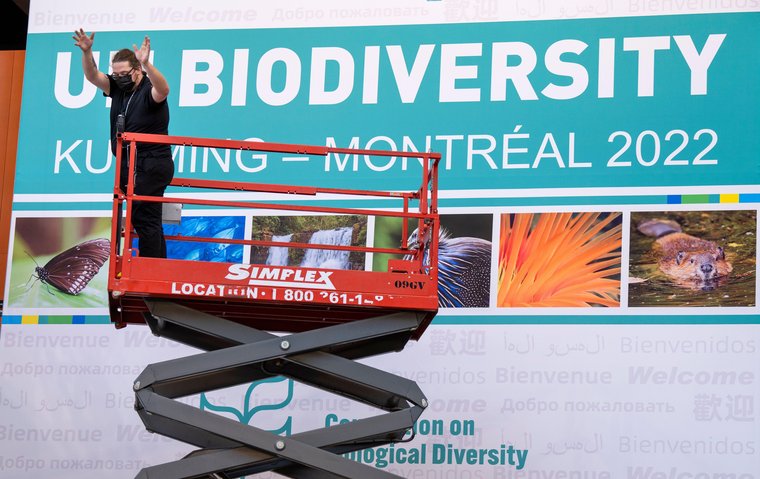From Open Democracy

The government is set to miss its flagship ‘30 by 30’ biodiversity target after ignoring recommendations from its own advisers, new documents obtained by Open Democracy reveal.
The 30 by 30 target – a global movement to protect 30% of all land and sea by 2030 for nature – was adopted by the UK in September 2020. It is the key focus of a UN biodiversity conference, COP15, opening in Montreal today.
The government has claimed a “key role” in “driving the campaign” for 30 by 30 – but new documents obtained under FOI reveal a failure of leadership at home.
Britain has failed to implement key recommendations on how to meet 30 by 30 made by its statutory adviser Natural England, a review of National Parks commissioned by the government, and its own internal analysts.
Wildlife groups have accused the government of “blindly ignoring” its own experts, putting the 30 by 30 target in jeopardy.
National Parks
Natural England has repeatedly advised ministers that, to meet 30 by 30, they must empower National Parks and Areas of Outstanding Natural Beauty (AONBs) to improve biodiversity in Britain.
In 2019, a “landscapes review”, commissioned by the government and led by the journalist Julian Glover, recommended that parks and AONBs get new legal purposes and multi-year funding deals to drive nature recovery.
Internal briefings obtained under FOI show that in 2020 Natural England urged Defra to adopt the Glover recommendations on parks and AONBs in order to “significantly increase their effectiveness”. But the government response in January to the Glover review offered no timeline for new legislation and failed to mention multi-year funding deals.
In May, after the government’s response to the review, Natural England again urged Defra to implement Glover’s recommendations and provide “adequate resourcing” to parks and AONBs – but no new funding measures have been announced.
Rose O’Neill, chief executive of the Campaign for National Parks, told openDemocracy the 30 by 30 target was “in jeopardy” and National Parks were “in an existential crisis because they have been perpetually underfunded. There is no way they will deliver 30 by 30 unless they get the powers and investment they need.”
Sir Gary Streeter, Tory MP for South West Devon, has tabled amendments to the Levelling Up & Regeneration Bill to implement the Glover recommendations – but the government has not committed to supporting them.
O’Neill urged ministers to back the amendments, saying: “This is the clear chance for this government to show its real intentions for nature – ministers have previously said that these new powers are absolutely necessary to deliver 30 by 30. [The] government must now get on and take action.”
Richard Benwell, chief executive of Wildlife and Countryside Link (WCL), a coalition of nature charities, told openDemocracy that the government’s 30 by 30 promise “will add up to nothing for nature without domestic action” and he urged ministers to support Streeter’s amendments.
“If [the] government gives the cold shoulder to these important amendments, against Natural England’s advice, its credibility on 30 by 30 would be thoroughly undermined,” he said.
WCL warned in October that just 3.22% of England’s land and 8% of the sea was effectively protected. This is an increase of just 0.22% of the land and 4% of the sea compared with last year.
Sites of Special Scientific Interest
The government is also ignoring Natural England’s call to create many more ‘sites of special scientific interest’ (SSSIs) – “the UK’s very best wildlife and geological sites”.
In July last year, Natural England told Defra there was “clear justification for increasing SSSI coverage” to meet the 30 by 30 target.
Natural England noted that every analysis commissioned by Defra on hitting 30 by 30 required the creation of 100,000 hectares of new SSSIs by 2030.
Only about 3,000 hectares of new SSSIs have been created since August last year, according to analysis by WCL, leaving the government seven years to create the remaining 97,000.
Habitats Regulations
Natural England also told Defra that it should abandon its plans to revise the EU-derived law that protects special habitats.
In March, Defra consulted on a proposal to fundamentally reform the Habitats Regulations Assessments – long considered a burden to property developers.
But Natural England’s response, obtained by openDemocracy, said the regulations were “an important and effective tool for nature’s recovery”. It said that some small changes were needed but rejected the case for sweeping changes.
Defra has refused to hand over property developers’ responses to the consultation.
The threat to Habitats Regulations is part of a wider government agenda to scrap EU-derived law – something wildlife groups have condemned as “an attack on nature”.
The Retained EU Law (Revocation and Reform) Bill proposes “sunsetting” thousands of laws copied from the EU to Britain’s statute book, including hundreds that protect nature and wildlife.
Craig Bennett, chief executive of the Wildlife Trusts, told openDemocracy the government would lose “credibility” at COP15 if this went ahead: “While other countries are looking to strengthen environmental protections, the UK government must be one of the only governments turning up in Montreal that is actively planning to remove them.”
He added the government “desperately needs a plan for how it’s actually going to make this happen, and it needs to be listening to its own nature conservation advisors as it puts that plan together – not blindly ignoring their advice.”
Forty MPs have written to Rishi Sunak imploring him to join the Montreal meeting after the prime minister U-turned on his decision not to attend COP27 in Sharm El Sheikh. Heads of state have not been formally invited but are able to attend if they wish.
Defra was approached for comment by openDemocracy but did not respond.


